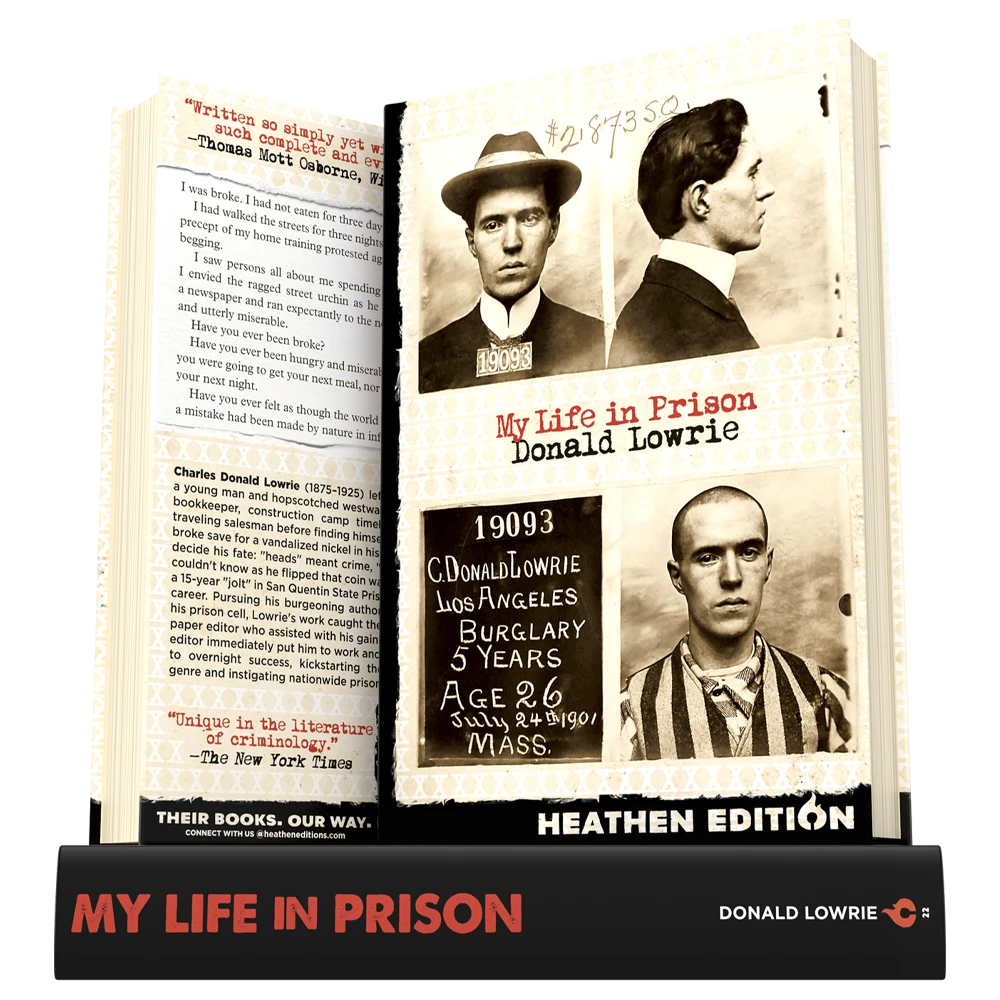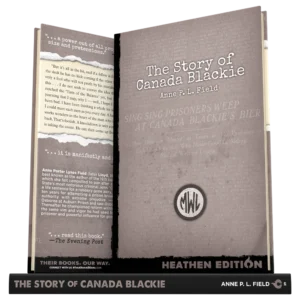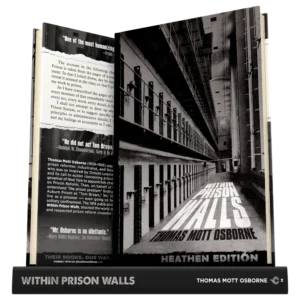No products in the cart.

My Life in Prison
Spine #22
Author
Donald Lowrie
Translator
First Edition
1912
Heathen Edition
March 26, 2023
Refreshed
Pages
448
Heathen Genera
Convictions
Paperback ISBN
978-1-948316-22-4
Hardcover ISBN
978-1-963228-22-9
I was broke. I had not eaten for three days.
I had walked the streets for three nights. Every fiber of my being, every precept of my home training protested against and would not permit my begging.
I saw persons all about me spending money for trifles, or luxuries. I envied the ragged street urchin as he took a nickel in exchange for a newspaper and ran expectantly to the next pedestrian. But I was broke and utterly miserable.
Have you ever been broke?
Have you ever been hungry and miserable, not knowing when or where you were going to get your next meal, nor where you were going to spend your next night?
Have you ever felt as though the world itself were against you and that a mistake had been made by nature in inflicting you with life?
Charles Donald Lowrie (1875–1925) left his Massachusetts home as a young man and hopscotched westward working as a stenographer, construction camp timekeeper, bookkeeper, railroad laborer, and traveling salesman before finding himself in Los Angeles starving and broke save for a vandalized nickel in his pocket – a nickel that would decide his fate: “heads” meant crime, “tails” meant suicide. What he couldn’t know as he flipped that coin was that fate would soon deliver a 15-year “jolt” in San Quentin State Prison and a wildly unique literary career. Pursuing his burgeoning authorial ambitions by lamplight in his prison cell, Lowrie’s work caught the eye of a San Francisco newspaper editor who assisted with his gaining parole after ten years. The editor immediately put him to work and My Life in Prison was birthed to overnight success, kickstarting the American prison literature genre and instigating nationwide prison reforms still in effect today.
Test Your Might
Paperback
OTHER RETAILERS
Rate & Shelve It
Hardcover
OTHER RETAILERS
Rate & Shelve It
"Written so simply yet with such power and such complete and evident sincerity."
Thomas Mott Osborne
Within Prison Walls
Heathenry
Contents
Praise
Details
Heathenry
This book is without a doubt one of the wildest I’ve ever read. Donald Lowrie’s simple, matter-of-fact delivery of events as they transpired within the walls of San Quentin only amplifies their consistent absurdity and often brutality, and the narrative is full to the brim with mysterious and compelling characters, not least of which is Lowrie himself. How we are the first publisher to both update and republish this book using a modern typeset—and why more people today haven’t heard of this story—is beyond me. But I’m proud of the honor because panning the literary streams of yesteryear for gold nuggets such as these is why Heathen Editions exists. Hopefully, and maybe with a little luck, our edition will attract new eyes because this story and its host of characters are truly begging for a much wider audience.
With that notion in mind, we’ve striven to enhance the text that you’re about to experience as much as possible, and we can only hope that this story may one day soon transcend its pages, whether that be a documentary or feature film, or a more aptly suited television series because these real-life characters deserve to be freed from the dusty bookshelves they’ve been relegated to for well over a century.
As for the text of this book, the original surely could have used another pass by an editor, which is surprising considering this story was originally serialized in the Bulletin.
We have corrected myriad spelling and punctuation errors, in addition to updating a few archaic and hyphenated words to reflect their modern usage. Additionally, we have added some 250 footnotes with further corrections and to supplement the text with context, clarification, and commentary as needed. We’ve also added section breaks in some of the chapters to help with Lowrie’s sometimes jarring tendency to switch topics without warning.
There also existed a numbering error with the original chapters: Chapters 23 and 26 were skipped over entirely. Whether those chapters were removed from the final version before print or their omission was a simple lapse in counting we cannot say barring a journey to San Francisco and burrowing into the Bulletin archives, so, meantime, we have inserted those chapters and left them blank intentionally.
We were also able to locate several photos of San Quentin approximate to the period of Lowrie’s incarceration, circa 1890s–1910s, which we have included where appropriate. And, in addition to Lowrie’s mugshots, we were able to use either direct information supplied by Lowrie throughout the text or his indirect clues and a bit of deduction to locate nearly two dozen more mugshots of inmates who populate this story, which we have placed where they seem most appropriate within the text. This is one aspect that I believe elevates and makes our edition of this book truly unique. For me, while it’s sometimes incredibly disconcerting to read the words about what these individuals endured, it’s something else entirely when you can actually see their faces and styled hair and dapper, early 20th century clothing (most sporting fine hats that make me nostalgic for a time I never knew) versus the dichotomy of their shaved heads and faces and those plain, bold prison stripes. Convicts assuredly—whether wrongfully or rightfully—but humans absolutely. . . .
To read our full thoughts, check out: My Life in Prison is one of the wildest books. . .
Also, be sure to check out Donald Lowrie’s thoughts on writing: Writers on Writing: Donald Lowrie
Contents
Heathenry: Thoughts on the Text
My Life in Prison
My Life in Prison
Praise
“Then in 1912 appeared a very influential work—Donald Lowrie’s first book, My Life in Prison.” —H. Bruce Franklin, Prison Literature in America
“When Donald Lowrie finished the last chapter of My Life in Prison it seemed fairly certain that … a notable book had been accomplished, fully justifying the sensational success it achieved overnight.” —The New York Times Book Review
“Written so simply yet with such power and such complete and evident sincerity.” —Thomas Mott Osborne, Within Prison Walls
“Some works boil down to, ‘I’m here because of my social class,’ a category tellingly defined by Donald Lowrie’s 1912 classic, My Life in Prison, which presaged some of the writings of the black radicals of the 1960s and 70s.” —Ralph Blumenthal, The New York Times
“Donald Lowrie, whose writings did for American prisons what John Howard’s did for those of England.” —Jack Black, You Can’t Win
“His first contribution consisted of an installment of his studies, My Life in Prison. At once he attracted attention. As he went from day to day the interest grew. In two weeks he was the sensation of San Francisco. In the street cars, on the ferries, in trains, everywhere in public, people were eagerly reading Donald Lowrie, and discussing his revelations. The work revealed fine observation and dramatic power. As it went from week to week without a break, the marvel grew. Here was a new writer that could publish an interesting article each day for six days in the week. In a few weeks Donald Lowrie printed more than one hundred thousand words. The success of the articles made Donald Lowrie a notable figure not only in San Francisco but throughout California.” —John D. Barry, The American Magazine
“My Life in Prison by Donald Lowrie, a book which greatly accelerated the movement for prison reform.” —Bruce Bliven, The New Republic
“Others have lifted, with more or less success, the gloomy pall from prison life —— Dickens, Reade, Galsworthy, Hopper, Bechdolt in ‘9009,’ Oscar Wilde in the haunting horror of ‘The Ballad of Reading Gaol,’ but, except in the case of Wilde’s immortal poem, it has been a stranger to its miseries who has hitherto attempted to describe what actually takes place from day to day in the dark house where the State undertakes to punish crime. Donald Lowrie’s story is thus unique in the literature of criminology.” —The New York Times
“But we need not go so far afield as England or Australia, nor back to 1854 or 1870 for prison cruelties. Read Donald Lowrie’s My Life in Prison and see what horrors were occurring in San Quentin prison up to within a few years.” —Thomas Mott Osborne, Society and Prisons
“Donald Lowrie shows us creatures extraordinarily like ourselves, living the abnormal life of a prison . . . He presents one man after another to us so clearly that we feel actually acquainted with them.” —Mary Alden Hopkins, The Publishers’ Weekly
“The book combines the intrinsic interest and the absolute convincingness of what is called a ‘human document,’ with the intangible yet awakening influence of a message from a prophet—the kind of prophet who, having descended into hell and risen again, is able both to tell us the facts and feelings that make up the inferno and to point confidently and convertingly toward the blessed opening of a way out.” —J.B. Kerfoot, Life Magazine
“With swift, acid sincerity Lowrie describes his sensations in his one and only attempt at housebreaking. The psychologic analysis he makes of himself recalls in its power [Robert Louis] Stevenson’s ‘Markheim.’ Donald Lowrie may not be a man of genius, but he is a cruelly keen observer of details. He has suffered, and his narrative quivers with compassionate indignation. He has lived in an atmosphere of overwhelming tragedy —— tragedy which society is responsible for creating.” —Coningsby Dawson, Everybody’s Magazine
“A book of such absorbing interest as this can do more than many volumes of penological discussion for the improvement of our penal system.” —The Green Bag
“Donald Lowrie’s My Life in Prison is a narrative of real prison life by a real convict, and it extends, not over one week, but ten years. As giving an insight into the life of the convict in most of our prisons the book is unequaled. Lowrie was a keen observer and no phase of prison life has escaped his observation —— the cells, the workshops, the treatment of women inmates, the man condemned to death and the manner of his execution, solitary confinement, the bullying of prisoners, their torture by the jacket, the light and dark sides of the inmate’s character, all of these and may other things are set forth in a manner which throws the ordinary novel into the shade. There are men who are strong enough to pass through such an experience without being ruined morally, mentally, and physically, and who can use their experience for the benefit of their unfortunate fellows. Mr. Lowrie is one of these. It should be the duty of everyone who feels the least interest in humanity and who is not indifferent to his own responsibilities as a citizen, to read this book from beginning to end.” —The O.E. Library Critic
Details
My Life in Prison
Heathen Edition #22Format: Paperback
Interior: Black & White on Cream Paper
Pages: 448 (+2 POD)
Language: English
Annotations: 205 Footnotes
Illustrations: 28
The Heathen Newsletter
Want to be kept in the loop about new Heathen Editions, receive discounts and random cat photos, and unwillingly partake in other tomfoolery? Subscribe to our newsletter! We promise we won’t harass you – much. Also, we require your first name so that we can personalize your emails. ❤️
@heatheneditions #heathenedition
Copyright © 2026 Heathen Creative, LLC. All rights reserved.




